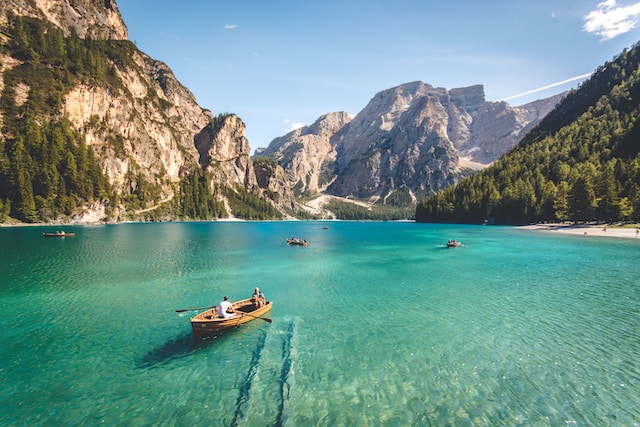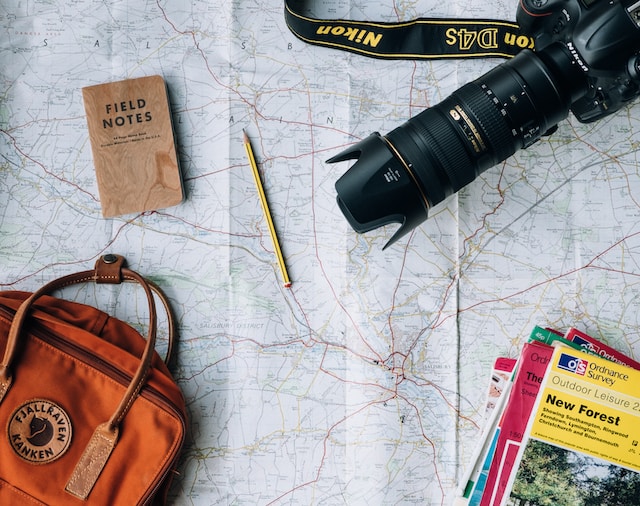Embarking on travel adventures in your golden years can be incredibly enriching and liberating. Travel allows you to explore new places, cultures, and experiences, creating cherished memories that last a lifetime.
However, for seniors, travel often requires a bit of planning and consideration to ensure a comfortable and enjoyable journey. In this comprehensive guide, we will share valuable tips and tricks for seniors to make their travels not only seamless but also thoroughly enjoyable.
Whether you’re planning a solo expedition, a family vacation, or a romantic getaway, these insights will pave the way for memorable and stress-free adventures.

1. Plan Ahead for Comfort, AKA Choose Senior-Friendly Destinations
When planning your trip, choosing the right destination for your travels as a senior is more than just picking a place on the map. It’s about ensuring that your journey is not only exciting but also comfortable and convenient.
Consider destinations that offer senior-friendly amenities such as accessible accommodations, easy transportation, and a relaxing atmosphere. Cities with well-maintained sidewalks, public transportation with senior discounts, and a variety of activities at a leisurely pace can enhance your travel experience.
Need help picking? We’ve made a list to make the decision easy. Check out The Best (and Worst) Destinations for Senior Travel to learn more.
2. Research Senior-Friendly Amenities
Before you finalize your travel destination, research the amenities that cater specifically to seniors. Look for accommodations with features such as accessible bathrooms, handrails, and elevators. Senior-friendly hotels or resorts often prioritize comfort and safety, making your stay more relaxing.
3. Check Transportation Options
Evaluate the transportation options available at your chosen destination. Senior-friendly destinations typically have reliable public transportation systems with facilities for people with mobility challenges. Look for cities that offer senior discounts on public transportation or have easily accessible taxi services.
Keep in mind that public transport can be dangerous in some countries. Do a lot of research in advance, and if a country has dangerous public transport, book a private car and driver to help you get around.
4. Consider Climate and Weather
Extreme heat or cold might not be ideal for senior travelers. Opt for destinations with mild and pleasant weather conditions, ensuring you can comfortably explore without worrying about temperature-related discomfort.
Remember that on the south side of the globe, the seasons are opposite. Meaning during winter, you should make plans to visit South America and Australia, but leave Europe travel for the summer.

5. Book Accessible Attractions and Activities
Senior-friendly destinations offer a variety of leisurely activities, such as guided tours, museums with comfortable seating areas, botanical gardens, and scenic spots that are easily accessible. Choose places where you can engage in activities at your own pace.
If you use a mobility aid, like a wheelchair, be sure to take this into account as you book, ensuring that everything you want to see in a country is accessible to you. Some tours and locations are only accessible by wheelchair with advance notice, so you’ll want to look at these things well in advance of your trip.
6. Investigate Language and Communication
Consider destinations where English is widely spoken or where you can easily communicate in a language you are familiar with. Clear communication ensures that you can express your needs and concerns effectively.
7. Local Cuisine and Dietary Options
Choose places where restaurants offer a variety of dietary options, catering to different tastes and dietary restrictions. Enjoying the local food is an integral part of travel, and having diverse choices ensures a delightful culinary experience.
But, as you travel, you should also be careful of foods that may be undercooked or could upset your stomach. For more information, take a look at the CDC’s Food Considerations While Traveling.
8. Consider Health and Medication Management
Ensuring your well-being during your journey is paramount. But even before it begins, you’ll want to be thorough about considering your health, meeting with your physician, and reviewing your medications to ensure an adequate supply before you travel.
Prioritize Your Health
Your health is your most valuable asset, especially when you’re on the road. Before embarking on your journey, schedule a visit with your healthcare provider to discuss the vaccinations needed for your destination and address any concerns you may have.
This will also enable you to have your physician conduct a thorough check-up to ensure you are fit for travel and give you peace of mind. Address any concerns you might have, and inquire about specific precautions you need to take based on your health condition.
Research the locations of hospitals, clinics, and pharmacies in proximity to your accommodation beforehand. Knowing where to seek medical assistance if needed provides peace of mind during your trip. We have more information about how to go about this in our article Healthy Travel as an Older Adult.
Don’t think you’re healthy enough for international travel? There are many cool locations you can enjoy in the United States. Check out our 6 Best Botanic Gardens in the United States to learn more.
Medication Management
If you are on regular medications, it’s crucial to manage them effectively during your travels. Organize your medications in a pill organizer, clearly labeled for each day. Carry a sufficient supply for the duration of your trip, and pack extra in case of unexpected delays. Keep your medications in your carry-on bag, ensuring they are easily accessible.
Be cautious as you pack medications, as not all medicines given in the US are legal everywhere. Check local regulations to ensure you won’t have to worry about your medications being taken from you at the border.

9. Take a Look at Safety and Security
Prioritize destinations known for their safety and security. Research the local crime rates and choose areas that are well-lit and patrolled, especially if you plan to explore during the evenings. Safety is paramount for a comfortable travel experience.
Ensuring Safety and Security for Seniors During Travel
Traveling as a senior can be a fulfilling and enriching experience, but it also requires careful consideration of safety and security. Ensuring your well-being during your journey is paramount, allowing you to relax and enjoy your adventures without worry.
Choose Safe Destinations
When planning your trip, research destinations known for their safety and security. Look for places with low crime rates, political stability, and a reputation for being tourist-friendly. Popular tourist destinations often have well-established safety measures and are accustomed to hosting senior travelers.
You can get an idea of the safety of a location from the United States Travel Advisory website.
Stay In Established Accommodations
Opt for reputable and well-reviewed accommodations. Established hotels, resorts, or vacation rentals often prioritize the safety and comfort of their guests. They have proper security measures in place, well-lit premises, and secure entry points. Read reviews from fellow travelers to ensure the place you choose has a good reputation for safety.
Organize Travel Documents
Keep all your travel documents, such as passports, tickets, and travel insurance, in a secure travel organizer. Avoid carrying large amounts of cash or displaying expensive jewelry. Invest in a secure money belt or a neck pouch that you can wear under your clothing.
These discreet accessories keep your valuables and travel documents safe from pickpockets and theft. Also, make photocopies of important documents and keep them separately in your luggage and also provide them to your family back home if you need them to provide in an. emergency.
Be Aware of Your Surroundings
Stay vigilant and aware of your surroundings, especially in crowded or unfamiliar areas. Avoid poorly lit or deserted streets, and be cautious when interacting with strangers. Traveling with a companion or in a group can provide an added sense of security.
Keep Emergency Contacts Handy
Carry a list of emergency contacts, including local authorities and your embassy or consulate. Share your itinerary with a trusted friend or family member back home. Having these contacts readily available ensures you can seek help in case of any emergencies.
Secure Your Accommodation
Ensure your accommodation is secure. Lock all doors and windows when you leave your room. Use the hotel safe for valuable items and documents. If you have any concerns about the safety of your accommodation, don’t hesitate to contact the front desk or hotel management.
10. Establish Emergency Preparedness and Buy Travel Insurance
Before your trip, create a list of emergency contacts, including family members, your healthcare provider, and the local embassy or consulate at your destination. Carry this list with you at all times.
Also, provide a detailed itinerary of your travel to your relative and or friend so they know where you will be and can assist remotely if needed. Research healthcare facilities at your destination and know the locations of hospitals and clinics. Being prepared for emergencies ensures that you can promptly seek medical assistance if needed.
Travel Insurance Coverage
Invest in comprehensive travel insurance that covers medical emergencies. Travel insurance provides financial protection in case you need medical treatment abroad. Read the policy thoroughly, understanding the coverage limits and the procedure for filing a claim. Having travel insurance gives you peace of mind, allowing you to focus on enjoying your trip.

11. Pack Wisely
Packing for a trip can be both exciting and overwhelming, especially for seniors. It’s all about striking the perfect balance between having everything you need and traveling light. Wise packing ensures you have a hassle-free and enjoyable journey. These are some ways that can help you to pack light for travel.
Plan Your Outfits
Before you start packing, plan your outfits according to your travel itinerary. Consider the weather and activities you have planned. Choose versatile clothing items that can be mixed and matched. Opt for wrinkle-resistant fabrics to minimize the need for ironing, allowing you to look polished with minimal effort.
Pack Light Layers
Layers are the key to adapting to different weather conditions. Pack light layers that can be added or removed as needed. A lightweight, waterproof jacket and a shawl or scarf can be incredibly useful. Choose clothing that is comfortable for walking and exploring, ensuring you can enjoy your activities without discomfort.
Take Essential Items
Certain items are essential for every senior traveler. These include prescription medications, a first aid kit, a travel adapter, and a compact travel umbrella. Pack these items in your carry-on bag for easy access during your journey. Don’t forget your eyeglasses, hearing aids, and necessary toiletries.
Footwear Matters
Comfortable footwear is paramount for senior travelers. Invest in a pair of sturdy, supportive walking shoes. If you plan on exploring different terrains, consider lightweight hiking sandals with good traction. Pack a pair of comfortable slippers or slip-on shoes for relaxation at your accommodation.
Tech Gadgets
Traveling smart includes having the right tech gadgets. A lightweight tablet or e-reader can store all your reading materials. A smartphone with essential apps like translation and maps is invaluable. Don’t forget the chargers and a power bank to keep your devices charged throughout your journey.
12. Plan Enjoyable Activities and Sightseeing
Create an itinerary that allows you to leisurely explore your destination. A plan of activities and sightseeing tours at a relaxed pace can provide opportunities to immerse yourself in the area and community.
Consider guided tours with comfortable transportation and opportunities to sit and rest. Engage in activities that align with your interests, whether it’s visiting museums, enjoying nature walks, or savoring local cuisine.
13. Engage Socially and Make Memories
As you travel, do your best to participate in social activities within your accommodations or community events at your destination. Engage with fellow travelers, locals, and other seniors. Making connections enhances your travel experience and can lead to lifelong friendships.
Don’t forget to ask for numbers and email addresses, and don’t be afraid to ask your new friends to join you on pre-planned activities. You never know when a travel companion can become a lifelong friend!
Traveling as a senior can be a fulfilling and enriching experience when approached with careful planning. Embrace the adventure, savor every moment, and let your travels as a senior be a testament to the vibrant spirit that age cannot diminish. Here’s to your next exciting adventure – may it be filled with unforgettable experiences and the joy of discovering the world anew. Safe travels!


















